REFILE-UPDATE 1-'Everyone was in the loop': 3 takeaways from Sondland impeachment testimony

- Country:
- United States
A U.S. diplomat who is a pivotal witness in the impeachment inquiry into President Donald Trump said on Wednesday he worked with Trump's personal attorney Rudy Giuliani on Ukraine issues on "the president's orders," confirming the president's active participation in a controversy that threatens his presidency. Here are three takeaways from the testimony of Gordon Sondland, the U.S. ambassador to the European Union:
ACTING ON TRUMP'S ORDERS
Unlike other witnesses who have testified in the televised impeachment hearings, Sondland communicated directly with Trump as he pressured Ukraine to undertake investigations that could boost the president's re-election prospects next year.
Sondland said Trump did not tell him specifically what he wanted Kiev to investigate but directed him to work with Giuliani, who did not have an official role with the U.S. government. Giuliani's instructions "reflected President Trump's desires and requirements," he said.
That undercuts a central argument of Trump's Republican defenders: that many of the witnesses at the inquiry were relaying second- or third-hand information and did not have direct knowledge of Trump's intentions. Sondland said Giuliani pressed Ukraine to investigate Burisma, a natural gas company on which Hunter Biden, the son of Democratic presidential candidate Joe Biden, has served as a director. Giuliani also wanted Ukraine to investigate a discredited conspiracy theory that Kiev, not Moscow, interfered in the 2016 presidential election.
Sondland said he did not realize until later that Giuliani's request to investigate Burisma was meant to dig up damaging information on Joe Biden.
QUID PRO QUO
Sondland said that Trump's administration refused to arrange a telephone call and set up a coveted Oval Office meeting between the president and Ukraine's new president, Volodymyr Zelenskiy, unless the Ukrainian leader publicly promised to undertake investigations that could help Trump politically. That contradicts Trump's main defense - that there was no explicit exchange of favors between the two countries.
"Was there a quid pro quo? As I testified previously, with regard to the requested White House call and White House meeting, the answer is yes," Sondland said. In using that phrase, Sondland went further than his early testimony in which he was more circumspect on whether the meeting and phone call were conditioned on Ukraine carrying out the investigations that Trump sought.
Sondland says he gradually came to realize that the White House was also withholding $391 million in security aid in order to pressure Kiev. He says he told a Zelenskiy aide in early September that Ukraine likely would probably not get the money until it took "some kind of action on the public statement that we had been discussing for many weeks."
NOT A ROGUE OPERATION
Other witnesses have said Sondland was part of a rogue operation designed to circumvent regular diplomatic channels. But Sondland said he told senior administration officials at the National Security Council and the State Department what he was doing.
"Everyone was in the loop. It was no secret," he said. Among those named by Sondland include: Secretary of State Mike Pompeo; acting White House chief of staff Mick Mulvaney; Mulvaney's senior adviser, Rob Blair; Pompeo's counselor, Ulrich Brechbuehl; Lisa Kenna, the State Department executive secretary; John Bolton, Trump's national security adviser at the time; Bolton's deputy, Fiona Hill; and Timothy Morrison, who replaced Hill.
In addition, Sondland said he told Vice President Mike Pence in September that the Ukraine aid appeared to be stalled because of the demand for investigations. "The vice president nodded, he heard what I said, and that was pretty much it," he said.
Sondland's testimony could be particularly damaging for Pompeo, a Trump loyalist who is reported to be considering a run for the U.S. Senate in his home state of Kansas. Sondland provided messages showing that the two communicated about his effort to get Ukraine to undertake the investigations sought by Trump.
Pompeo appeared to approve of his efforts. "You're doing great work; keep banging away," Pompeo told Sondland in early September, according to email correspondence cited in Sondland's testimony.
Sondland's testimony could help Pompeo's potential political rivals in Kansas make the case that the secretary of state was more concerned with catering to Trump's whims than ensuring the integrity of U.S. foreign policy. Pompeo has been widely criticized for failing to defend U.S. diplomats who were targeted by Trump and his allies. However, Kansas is a heavily Republican state, and there are few indications that the impeachment has eroded Trump's support among conservative-leaning voters.
(This story has not been edited by Devdiscourse staff and is auto-generated from a syndicated feed.)
ALSO READ
US Senate panel chair issues subpoena in Supreme Court ethics probe
US Senate committee to hold hearing on Boeing safety culture report
US Domestic News Roundup: Kamala Harris heads to Arizona after abortion ban; US Senate panel chair issues subpoena in Supreme Court ethics probe and more
US Senate votes to reject rule to cut greenhouse gas emissions on highways
US Senate committee to hold hearing on Boeing safety culture report










